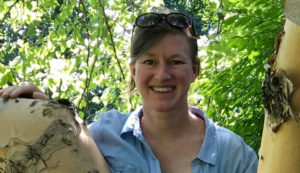
Years as a teacher: 25
Years at LGA: 19
Why did you become a teacher?
Because I wanted to make a difference in the world and in the lives of children.
What do you love about teaching at LGA?
I enjoy the creativity and flexibility I am allowed as a teacher at LGA. We don’t have to worry about state testing, and we can really focus on children and their needs and interests, and on the joy of learning. I’ve learned so much about teaching, but mostly about knowing and understanding kids.
What is your favorite topic/subject to teach and why?
I love teaching math in the world. I enjoy it because it’s everywhere: numbers and geometry, measuring, comparing, estimating… I want kids to recognize that math is all around them, and can be fun. From graphing interests to estimating amounts, to noticing vertical and horizontal lines in the classroom… Math is not just about adding and subtracting.
How is LGA different than other schools?
LGA is different from other schools in the personal attention each child gets. The whole staff takes the time to learn everyone’s names and everyone’s needs.
What are some projects you’ve done that kids really love and why?
I love working on the kindergarten opera because it is a culmination of all the writing we do in language arts during the year, and it is student driven. The students are so invested and engaged in writing and performing.
Throughout the year we learn about character and plot and what makes a good story, then at the end of the year it is their turn. They take such pride in their work, and are so capable. It is an amazing project.
I also really enjoyed grocery shopping for the refugees with the kindergarten class. It felt good to know we were doing something important that was directly helping a family in need.
What benefits do you see from LGA’s dual general studies and Judaics curriculum?
I think learning a second language is extremely important in brain development. I wish all schools taught a second language starting in kindergarten.
I also think that our dual curriculum gives students insight into Jewish culture and the world. It makes connections past and present. We study, for example, where bread comes from, from seed to table, and how it has been made over time for generations. I love this!
How do your students change between the beginning and the end of the year?
I’ve seen some amazing changes: students have a better sense of self-worth, and who they are as learners and as human beings. I think they end the year being better prepared to be engaged community members who are excited about learning.
They learn to appreciate math, to be curious about the world they live in, and to be kind to one another. I was amazed during end-of-year conferences by the number of parents who unprompted told me their child loves math. That made me feel great!

Copyright © 2024 Lander-Grinspoon Academy. All rights reserved. Website designed by Addicott Web.